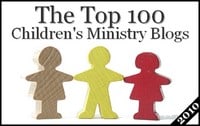 I have become a firm believer that the blame for many of the discipline issues we face in children’s ministry cannot be placed completely on the children.
I have become a firm believer that the blame for many of the discipline issues we face in children’s ministry cannot be placed completely on the children.
After all, most of the time, children are just being children – they have not been deliberately sent by the devil to disrupt your class, service or small-group.
It starts with US. Yes, you and me and our ability to plan ahead, be engaging and go the extra mile. In this way, we aren’t just disciplining children- instead, we can attempt to steer children, who are simply being children, so they can have a positive experience, learn something new, stay safe and encounter an almighty God.
We have to handle the discipline issues before the discipline issues ever start:
Have a PLAN for the Kids from the Moment they Arrive Until the Moment they Leave
Be properly prepared to carry-out that plan in your service or class… Remember: if you are not prepared and you don’t have a plan, the kids are always prepared with their plan… and they will begin carrying it out.
This doesn’t mean you have to be super-rigid and run a military-reform school. You can have free-time, or activity time – but, schedule it and make the time-frame seem intentional.
Give Them Something To Do
When kids enter your room, do you expect them to just sit there and wait until you’re ready? Again, they will interpret that as boring. Have activities and engaging things ready so when kids enter your room, they have something to do besides implement their own plan. We have game tables with UNO cards, Rock-Em-Sock-Em Robots and Jenga Blocks. We have a LEGO table. We 2 long tables covered with paper so kids can draw whatever they want. We have Speedstacks tables with timers. Occasionally, we have the old Nintendos with Mario Cart hooked-up.
These activity tables not only give the kids something to do when they enter the room, it is a way for them to connect with each other… and it’s a way for our leaders to engage with the kids and build the relational bridge (see below).
Don’t be Boring!
If kids interpret what you’re doing as “boring”, they will have something they interpret as “fun” ready to go. Use variety, and relevant teaching methods. Use a child’s natural intensity level when planning your services. In other-words: put fun, exciting and fast stuff on the front end of your service. Put the serious stuff in the middle. End your service with fun, exciting and fast stuff. See my series on the Kids Are Bored
Aim at the older children with the stuff and aim at the younger children with the length: Use music, graphics, video clips, characters and verbiage the older crowd will relate to… the younger kids will “aspire up” and want to be like the older kids. However, use a minute per year of age for each segment. If the youngest child in your service is 6 – You have 6 minutes max for each segment. See my post on How a Child Interprets Their World
Have Clearly Stated Rules Ahead of Time.
These should be rules that BOTH the child and parent understand… and these should also be rules that CAN BE followed by the child.
Ron Brooks and I differ on our approach – and yet, we are still friends 🙂 Ron’s approach is pushing a positive outcome from the children ie. I Can Listen, I Can Show Respect, etc. For more of Ron’s view on rules, head over to his post.
Mine are direct and straightforward:
- Don’t Leave Your Seat Without Permission – I emphasize that there will be times that permission is given. I also state that invading someone else’s seat with your hands or feet is leaving your seat.
- Don’t Talk Without a Microphone – I want the kids to know that there will be times to answer questions, but wait until the microphone is put in front of you. There will be appropriate times to laugh and cheer – but wait for something funny to happen.
- Wear Your Name Tag – I want our kids to stay safe. I want to know that they are supposed to be in the room. I also want to get to know them and call them by their own names.
- Everyone Participates: This way, no one person is left out and we get everyone involved.
- Obey All Rules – This covers the first few rules, but it also covers any instruction or directive that is given by any of our leaders.
Consistently Review the Rules. Kids cannot follow your rules if they don’t know what those rules are each week. We carve-out a time at the very beginning of our service to review the rules. Sometimes it’s quick and takes all of 2 minutes to review and explain the rules. Sometimes something fun happens… like a character enters who has the wrong idea about what the rules are. Sometimes we have a quiz-show and get kids from the audience to state our rules. Either way, guests will know what’s expected and regulars will be reminded.
Consistently Enforcing Those Rules. Make sure you and your leaders know when the best course of action is to sit with a disruptive child; when it’s time to separate children to different seats; when a child should remain afterwards so a discussion with a parent is necessary or when a child should be removed from a service or classroom and a parent needs to be notified. Read my last post on confronting parents.
Offer Incentives. Don’t just skip over this section. I have people all the time think that it’s wrong to bribe kids. Bribery has very little to do with incentives. Here’s my thought: Every kid wants to earn the trophy. It’s really about the recognition for following the rules. Sometimes offering a tangible reward (candy, points for their team, points or “Bible Bucks” for your prize store, etc) is a great way to reward children – they all want to win the trophy. Other times, just “catching” kids who follow your rules with a lot of positive recognition in front of everyone else will make them want to earn it again. Both methods make others in the room want to earn the same trophy.
Enter a Kids’ World. Be relational. This earns you the right to be heard and respected – thus, eliminating a whole lot of discipline issues. Before I teach a group of kids, I love to walk around, give high-fives, fist bumps and shake hands. I ask funny questions and play as many of the games and activities as I can with the kids. I try to notice new shoes, haircuts, dresses and the toys kids bring with them. It let’s children know that I notice them and see them as a priority – not an afterthought. See my post on the Stuff I’ve Kept in my Pockets.
Deliberately Approach “Those Kids”. You know the ones… these are the kids that you secretly hope are on vacation each week. They are the children who are consistently rambunctious, disrespectful and you seem to have issues with them any time they are in your class or service. I have had to make it a priority to pray for those kids during the week. I have asked God to give me compassion for these kids we typically define as “problem children”. And I believe that God has given me compassion for these kids.
Walk up to those kids each time they darken your door, get down on their level, look them in the eyes, smile your biggest and most sincere smile and tell them how happy you are that they are there. Ask them about their week, Ask them what was the funnest thing they did that week in school, invite them to play an activity with you. You will notice a difference.
I realize this has been a long post, but hopefully it’s given you some ideas as to how you can handle the discipline issues before they really become issues.
If you missed it or cannot join us, I will post the link to the podcast at a later date.

 These past weeks, as I’ve mentioned, I’ve taught on the Word of God for our Children’s Large-group format.
These past weeks, as I’ve mentioned, I’ve taught on the Word of God for our Children’s Large-group format.






